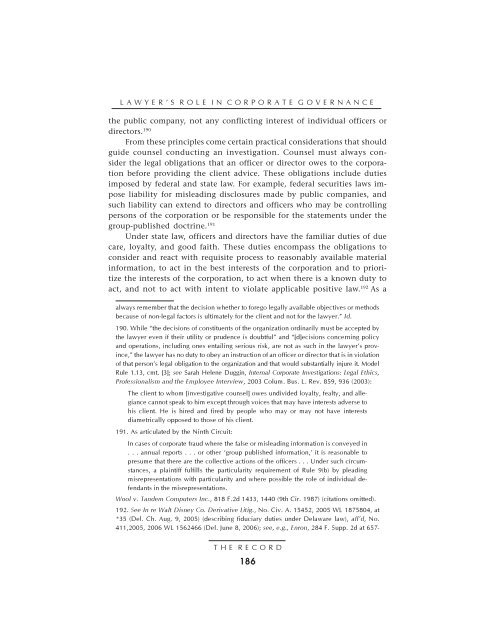2007 Issue 1 - New York City Bar Association
2007 Issue 1 - New York City Bar Association
2007 Issue 1 - New York City Bar Association
You also want an ePaper? Increase the reach of your titles
YUMPU automatically turns print PDFs into web optimized ePapers that Google loves.
L A W Y E R ’ S R O L E I N C O R P O R A T E G O V E R N A N C E<br />
the public company, not any conflicting interest of individual officers or<br />
directors. 190<br />
From these principles come certain practical considerations that should<br />
guide counsel conducting an investigation. Counsel must always consider<br />
the legal obligations that an officer or director owes to the corporation<br />
before providing the client advice. These obligations include duties<br />
imposed by federal and state law. For example, federal securities laws impose<br />
liability for misleading disclosures made by public companies, and<br />
such liability can extend to directors and officers who may be controlling<br />
persons of the corporation or be responsible for the statements under the<br />
group-published doctrine. 191<br />
Under state law, officers and directors have the familiar duties of due<br />
care, loyalty, and good faith. These duties encompass the obligations to<br />
consider and react with requisite process to reasonably available material<br />
information, to act in the best interests of the corporation and to prioritize<br />
the interests of the corporation, to act when there is a known duty to<br />
act, and not to act with intent to violate applicable positive law. 192 As a<br />
always remember that the decision whether to forego legally available objectives or methods<br />
because of non-legal factors is ultimately for the client and not for the lawyer.” Id.<br />
190. While “the decisions of constituents of the organization ordinarily must be accepted by<br />
the lawyer even if their utility or prudence is doubtful” and “[d]ecisions concerning policy<br />
and operations, including ones entailing serious risk, are not as such in the lawyer’s province,”<br />
the lawyer has no duty to obey an instruction of an officer or director that is in violation<br />
of that person’s legal obligation to the organization and that would substantially injure it. Model<br />
Rule 1.13, cmt. [3]; see Sarah Helene Duggin, Internal Corporate Investigations: Legal Ethics,<br />
Professionalism and the Employee Interview, 2003 Colum. Bus. L. Rev. 859, 936 (2003):<br />
The client to whom [investigative counsel] owes undivided loyalty, fealty, and allegiance<br />
cannot speak to him except through voices that may have interests adverse to<br />
his client. He is hired and fired by people who may or may not have interests<br />
diametrically opposed to those of his client.<br />
191. As articulated by the Ninth Circuit:<br />
In cases of corporate fraud where the false or misleading information is conveyed in<br />
. . . annual reports . . . or other ‘group published information,’ it is reasonable to<br />
presume that there are the collective actions of the officers . . . Under such circumstances,<br />
a plaintiff fulfills the particularity requirement of Rule 9(b) by pleading<br />
misrepresentations with particularity and where possible the role of individual defendants<br />
in the misrepresentations.<br />
Wool v. Tandem Computers Inc., 818 F.2d 1433, 1440 (9th Cir. 1987) (citations omitted).<br />
192. See In re Walt Disney Co. Derivative Litig., No. Civ. A. 15452, 2005 WL 1875804, at<br />
*35 (Del. Ch. Aug. 9, 2005) (describing fiduciary duties under Delaware law), aff’d, No.<br />
411,2005, 2006 WL 1562466 (Del. June 8, 2006); see, e.g., Enron, 284 F. Supp. 2d at 657-<br />
T H E R E C O R D<br />
186

















